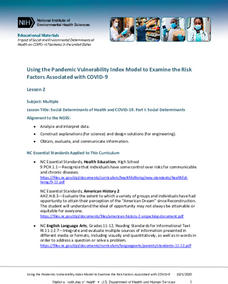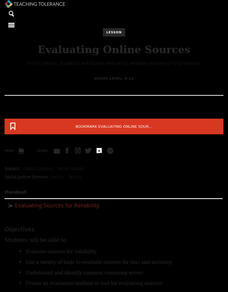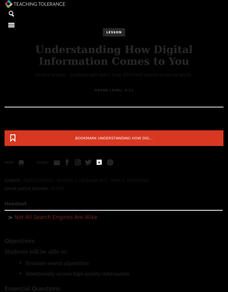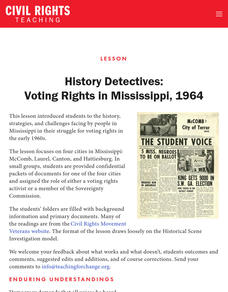National Institute of Environmental Health Sciences
Lesson 2: Using the Pandemic Vulnerability Index Model to Examine the Risk Factors Associated with COVID-19
A lesson asks young mathematicians to investigate the social determinants and the environmental factors that influence risk factors associated with the spread of COVID-19. Class members then brainstorm what they can do to alleviate the...
Teaching Tolerance
Constructively Engaging in Digital Communities
Say no to hate speech! Pupils discover the importance of practicing empathy and inclusivity in digital communities and discuss strategies for responding to online hate speech. Then, small groups develop and present class guidelines for...
Teaching Tolerance
Evaluating Online Sources
Newspapers, television, social media ... how do people get their news? Using the informative resource, scholars locate and verify credible sources of information. Working in small groups, they discuss strategies for evaluating the...
Teaching Tolerance
Understanding How Digital Information Comes to You
Google, Yahoo!, Bing ... so many choices, so little time! Using the resource, scholars explore how different search engines affect the way they find information. After reading a handout on the topic and engaging in small group...
Nemours KidsHealth
Fitness: Grades 6-8
Middle schoolers will get a kick out of a lesson that asks them to first design a proposal for a kickboxing routine for Kickin' Kelly's new DVD. A second activity has them explaining the fitness routine they will follow to prepare to be...
Nemours KidsHealth
Online Safety: Grades 9-12
Teach teens how to protect themselves from hackers, scammers, and online predators. First, class members examine their own digital footprints think critically about their online profile. Groups then generate lists of "do" and "don't do"...
Nemours KidsHealth
Media Literacy and Health: Grades 9-12
An essential skill for 21st-century learners is to know how to find reliable sources of information. Two activities help high schoolers learn how to determine the reliability of health-related news from websites, TV, magazines, or...
Nemours KidsHealth
Food Safety: Grades 9-12
Food poisoning, salmonellosis, E. Coli, shigellosis, tapeworms—all these words can strike fear into eaters. Alas, the five-second rule is not necessarily true! Two activities teach teens safety rules for food purchasing, preparation,...
Nemours KidsHealth
Water Safety: Grades 9-12
Make a big splash with a lesson about water safety. After reading three articles related to water safety, high schoolers first choose one water safety rule to research and write a report summarizing their findings. They then use an...
Nemours KidsHealth
Peer Pressure: Grades 9-12
Peer pressure is not always negative. It can also inspire, encourage people to get involved, and help push change. Class members select a quotation from a provided list and craft a paragraph about the meaning of the statement, how it...
Nemours KidsHealth
Getting Along: Grades 9-12
Wouldn't it be lovely if we could all just get along! Fortunately, the skills needed to build and maintain healthy relationships can be learned. Two activities help high schoolers build these skills. First, a class member reads a series...
Nemours KidsHealth
Empathy: Grades 9-12
Empathy can be the glue that holds a society together. Learning how to see and appreciate a situation from another's point is key to developing empathy toward others. The two activities in this resource are designed to help teens...
Nemours KidsHealth
Healthy Snacking: Grades 9-12
Snacks—even the word can conger up a hunger. Rapidly growing teens, especially, rely on snacks to get them from one meal to the next. After reading a series of articles about nutrition and healthy snack choices, pupils fill out a report...
Nemours KidsHealth
Food Labels: Grades 9-12
Check the label! That's the big idea in a lesson about using the nutrition facts on food labels rather than advertising hype to make healthy choices about what to eat. After reading background articles and learning how to read nutrition...
Nemours KidsHealth
Breakfast: Grades 9-12
Sleep and food are brain fuels, and teens require a lot of both, but getting high schoolers up in time to have a healthy breakfast before they charge off to school can be a challenge. To meet this challenge, scholars first set up a...
Nemours KidsHealth
Germs: Grades 9-12
Beware the bugs! Two activities engage high schoolers in the study of germs, what they are, what they do to the body, and what can be done to prevent them from spreading. After reading a series of related articles, groups create a...
Nemours KidsHealth
Sports Safety: Grades 9-12
What to do and what not to do when training and playing sports. That is the focus of two activities designed for teens. In the first activity, individuals read research about factors that contribute to safe sport participation and share...
Teaching for Change
History Detectives: Voting Rights in Mississippi, 1964
Promises made and promise broken. Spies and activists. Voting rights in Mississippi are the focus of a lesson that has class members research the history of the struggle in Mississippi. Learners take on the role of voting rights...
Facing History and Ourselves
Reflection and Action for Civic Participation
Slacktivist or activist? Bystander or upstander? Positive social change requires involvement and commitment. After reading a series of articles about young people who chose to get involved, scholars examine a framework that helps peers...
Facing History and Ourselves
Responding to Difference in Democracy
Disagreements happen in a diverse democracy. It's what people do about these differences in a diverse society that the resource models. After listening to an eight-minute podcast about a woman who collaborated with people who have very...
Facing History and Ourselves
Insights on Democracy from South Africa
As part of their study of democracy, high schoolers listen to a podcast featuring two South African educators and their efforts to support the process of transforming the nation from apartheid rule into a democracy. Learners also read...
Facing History and Ourselves
Citizen Power Makes Democracy Work
Eric Liu's formula "power plus character equals citizenship" and his three strategies to making change happen model for high schoolers how to develop citizen power, how to get involved and participate to make democracy work. Class...
Facing History and Ourselves
Defining Democracy
For democracies, it is both the best and the worst of times. As part of a study of the challenges facing democracies, young political scientists seek first to define democracy, and then to consider the relationship between democracy and...
Teaching Tolerance
How Online Communication Affects Privacy and Security
Digital footprints leave a lot of clues behind! Pupils discuss the positives and negatives of having a digital footprint and what it means. Then, using a handout, scholars learn ways to protect their online privacy.

























